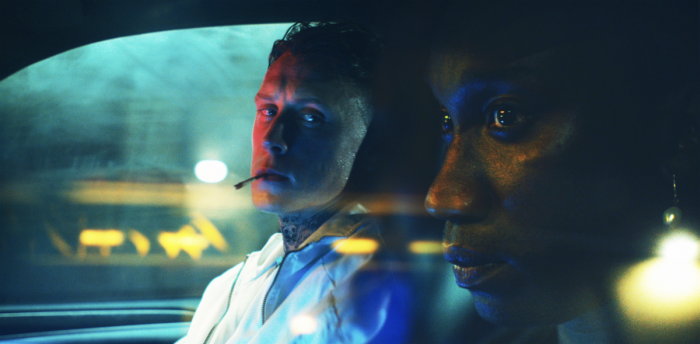

Revenge Thriller 'Femme' Presents a New Kind of Femme Fatale
By Sara Clements | Film | March 31, 2024 |
By Sara Clements | Film | March 31, 2024 |

The past six months have seen the release of several films that focus their lens on the art and beauty of drag culture, with characters from different walks of life. In Solo, a Montreal drag queen deals with the conflicts of his love life and relationship with his mother. In Unicorns, the thriving London “gaysian” scene takes center stage as a cross-culture romance ensues between a South Asian drag queen and a single father. In Layla, a struggling Arab queen in London falls in love for the first time. Love is at the center of all of these films, but so is identity, self-acceptance, and some complex, rewarding explorations of queer relationships.
These stories are interested in what it means to be unapologetically queer in spaces that aren’t accepting of us. Often, those spaces are those of family, religion, society itself, or even all three. Femme, the magnetic debut feature from writing-directing duo, Sam H. Freeman and Ng Choon Ping, examines this further in their story of a drag queen navigating life in East London. However, unlike Solo, Unicorns, and Layla, Femme (now in limited theatrical release and expanding on April 5th) isn’t a romantic drama. It’s a thriller. It’s a sexually charged, tension-filled revenge tale that flips the noir genre’s use of power dynamics on its head. It’s a complex quest for vengeance and healing that gets increasingly messy and complicated and feels like a queer film we haven’t seen before.
Femme, just like the other aforementioned films, treats its audience to the beauty of drag performance. Within this community, there’s nothing but celebration and love. Jules (Nathan Stewart-Jarrett) carries himself with so much confidence on stage, but that quickly disappears when outside of that environment. Walking outside, while displaying any form of dress that doesn’t reflect the social construct of masculinity, means that you can be met with harassment, even violence. It shouldn’t feel brave for Jules to make a quick trip to a corner store, but it is.
He runs into a thug named Preston (George Mackay) who, along with his mates, hurls homophobic comments at Jules - but he gives them right back in style. However, making fragile white boys feel humiliated has violent consequences. Violence against queer people is an everyday reality. It’s a reality we like to escape from when we consume media, but luckily Freeman and Ng know this. It’s important to show the violence to feel the significance of the film’s revenge angle, but the act is quick. The camera remains unfocused, just as the act really isn’t the focus of this story. It’s the shifting power dynamics that use violence and sex, not to exploit like some erotic thrillers, but to empower.
Shaken and bruised, the Jules we are first introduced to disappears. This assault has made him lose his love for his career, and frankly, life, as he withdraws from everything, even those he loves. By no longer being out and proud and embracing who he is, his friend says he’s just letting Preston win. Not long after, he makes two decisions that in this moment take a lot of courage: he puts on an earring and goes out. He walks faster now, though, and looks behind him with frequency. Visiting a gay sauna, he sees Preston for the first time since the assault. He’s the last person he’d expect to see in this place but introduces the theme of internalized homophobia that’s explored frequently in the genre. It’s this inward hatred that makes Preston hostile. Even though Preston pushed himself to be among other gay people, where he knows he really belongs, he hates it. Having no recognition of Jules without his makeup and hair, Preston invites him over to his place; and so begins a tale of revenge.
Freeman and Ng walk a fine line as the story unfolds, teetering into romance. The lines between desire and hatred get more and more blurred as the story moves forward, but it never falls into enemies-to-lovers territory that would make a film of this subject really problematic. Jules is simply playing the same game of pretend as Preston is with his tough guy persona. However, the moral obscurity the film plays with comes in when emotions get a little too real. Jules acknowledges this as he becomes frustrated, confused, and full of self-loathing over how close he’s getting to Preston. But through it all, the film is never out to make Preston’s actions redeemable. The characters are refreshingly imperfect, messy gays.
The performances on display from Stewart-Jarrett and MacKay are some of the best of the year so far. The pair have fiery chemistry. As Jules follows Preston home for the first time, Stewart-Jarrett carries apprehension and suspicion on his face, slowly building to anger in his breath. It’s a very internal battle he’s going through, fueled by his trauma. The feeling of anxiety he captures only grows stronger the more he interacts with Preston. The score here is perfect at reflecting the cogs that are turning in his head as he plans his act of retaliation. MacKay’s performance is very internal, as well, masked by loose-canon aggressiveness that slowly softens. Jules at one point asks Preston who he’s trying to impress by not embracing himself. The prison of masculinity is hard to break free of. The performances here are so well constructed and layered and the writing-directing duo never betray what we know of them.
There’s one scene in Femme where Jules finds himself in dangerous waters, treading around Preston’s friends. Invited to play a game of Street Fighter, Jules unleashes the kind of bashing that he wishes he could give to each of them. As the film proves, though, violence isn’t the best act of revenge. Jules and Preston both put on a performance, whether it’s one of denial or protection. For Jules, this leads him on a journey of healing to find himself again. The best act of revenge is being yourself.
← 5 Shows After Dark: 'The Walking Dead: The Ones Who Live' First Season Finale, 'Parish' Premiere AMC | 'Sasquatch Sunset' Is a Love Letter to Bigfoot Fans →
More Like This
Spoilers: Netflix’s Korean Comedy 'Chicken Nugget' Is Getting Review-Bombed Over A Single Joke
How 'The Regime' and 'Palm Royale' Complicate Their Genres
Review: Dirty Beautiful Josh O'Connor Digs Up The Past In 'La Chimera'
How 'X-Men '97' Sidestepped Cyclops' Biggest Sin And Redeemed A Tragic Foe
Is 'Palm Royale' the New 'Desperate Housewives'? Not Even Close

Jordan Klepper Knows How January 6th Insurrectionists Should Be Treated
‘Vanderpump Villa’ Is the Best Unintentional April Fools' Joke No One Asked For
Of Course Elon Musk's April Fool's "Joke" Was Painfully Unfunny
Gypsy Rose And Husband Split Three Months After Her Prison Release
Jenna Lyons Has Conditions For ‘Real Housewives’ Return
This Week On ‘Selling Sunset’: Irreconcilable Differences
More Like This
Spoilers: Netflix’s Korean Comedy 'Chicken Nugget' Is Getting Review-Bombed Over A Single Joke
How 'The Regime' and 'Palm Royale' Complicate Their Genres
Review: Dirty Beautiful Josh O'Connor Digs Up The Past In 'La Chimera'
How 'X-Men '97' Sidestepped Cyclops' Biggest Sin And Redeemed A Tragic Foe
Is 'Palm Royale' the New 'Desperate Housewives'? Not Even Close
Reviews